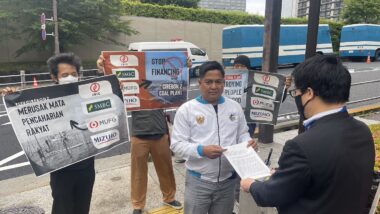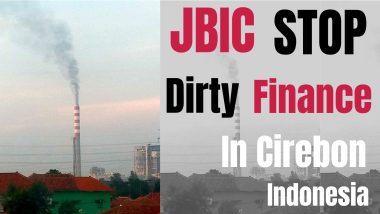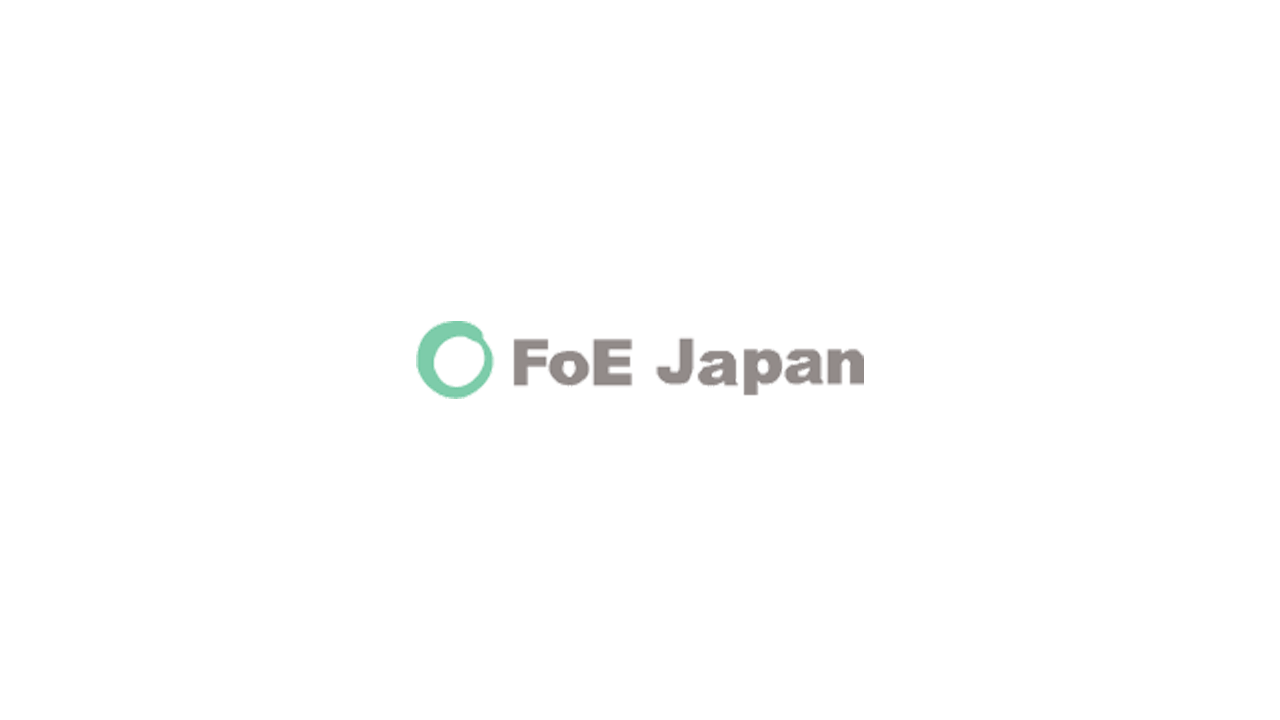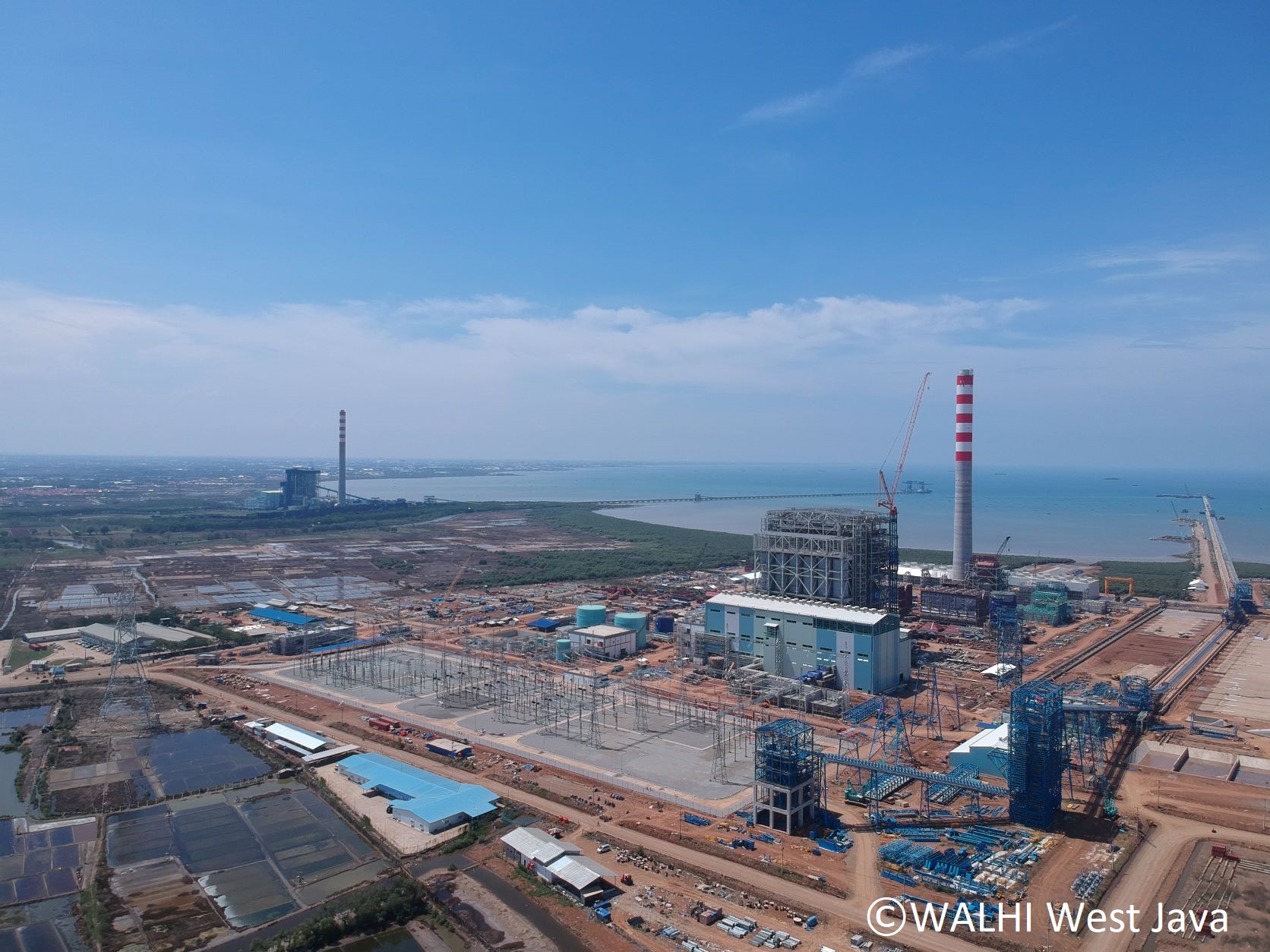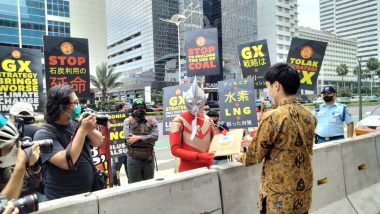Bribery of Project Owner Revealed at Cirebon Coal Plant Unit 2 in Indonesia - Request Submitted to MoF and JBIC for Prompt Suspension of Public Support
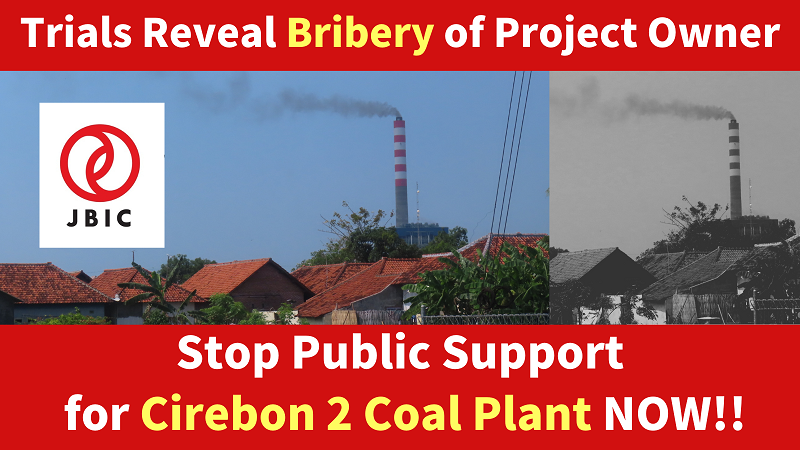
In the Cirebon Coal-Fired Power Plant Project – Expansion Plan (Unit 2, 1,000 MW) (hereinafter “Unit 2 Project") in West Java, Indonesia, for which the Japan Bank for International Cooperation (JBIC; all shares are owned by Ministry of Finance or MoF), three mega banks (SMBC, MUFG, and Mizuho), and others have provided financing, it was revealed during the process of a local court case that an project owner in which Marubeni and JERA have invested was involved in bribery.
In March of this year, the Indonesian Corruption Eradication Commission (KPK) indicted the former Cirebon regent in relation to a series of bribery and money laundering, including cases related to the Unit 2 Project, and the court trials have continued. Today, the former Cirebon regent was convicted of bribery and money laundering, including the cases related to the Unit 2 Project. In addition, the testimony of witnesses at the court trials and the statement of the defendant, the former Cirebon regent, mentioned that former senior managements of Cirebon Energi Prasarana (CERP. 35% owned by Marubeni Corporation and 10% by JERA), who is the project proponent of the Unit 2 Project and the direct borrower of JBIC and other banks, were involved in bribery activities.
In response to this crucial facts, environmental NGOs from Indonesia and Japan firstly submitted a request letter to MoF and JBIC, strongly urging JBIC, as a public agency, to promptly take measures to suspend their loan disbursement to the Unit 2 Project and to enforce mandatory prepayment of loans that they had disbursed, in accordance with the “Recommendation of the Council on Bribery and Officially Supported Export Credits” (hereinafter “OECD Bribery Recommendation").
With regard to the Unit 2 project, many issues have been pointed out, including the impact on local residents, such as loss of means of livelihood and environmental pollution; illegal processes, such as violation of the Cirebon Regency Spatial Plan and the improper issuance of environmental permits; human rights violations, such as harassment and intimidation against residents who express opposition and concerns; and retrogression against climate change measures. Thus, there have been repeated calls for the project to be halted. To begin with, the necessity to implement the Unit 2 project in the Java-Bali power grid, which is expected to have a reserve margin of 40-60% (from 2021 to 2030), has also been questioned. JBIC must promptly withdraw its public support for the Unit 2 project, which has been unfairly pushed through in a manner that also involves bribery.
For more details, please see the following letter of request. (Click here for PDF)
Re: Request for Measures to Suspend the Loan Disbursement and Mandatory Prepayment Concerning the Cirebon Coal-Fired Power Plant Project – Expansion Plan in Indonesia
August 18, 2023
Mr. Shunichi Suzuki, Minister of Finance
Mr. Nobumitsu Hayashi, Governor, Japan Bank for International Cooperation (JBIC)
Bribery allegations have been raised since 2019 with respect to the Cirebon Coal-Fired Power Plant Project – Expansion Plan (Unit 2, 1,000 MW) (hereinafter “Unit 2 Project") in West Java, Indonesia, for which Japan Bank for International Cooperation (JBIC) has been disbursing the loans since November 14, 2017. [1] And in March of this year, the Indonesian Corruption Eradication Commission (KPK) indicted the former Cirebon regent in relation to a series of bribery and money laundering, including cases related to the Unit 2 Project, and the court trials have continued.
Today, the former Cirebon regent was convicted of bribery and money laundering, including the cases related to the Unit 2 Project. In addition, the testimony of witnesses at the court trials and the statement of the defendant, the former Cirebon regent, mentioned that former senior managements of Cirebon Energi Prasarana (CERP), who is the project proponent of the Unit 2 Project and the direct borrower of JBIC, were involved in bribery activities.
They are very crucial facts that bribery in connection with the Unit 2 Project was definitely committed, and that not only Hyundai Engineering and Construction Co, (hereinafter “Hyundai"), the EPC contractor for the Unit 2 Project, but also former senior managements of CEPR, the borrower of JBIC, were also involved in the said bribery, which have been revealed through the court trials and the verdict. We strongly urge JBIC, as official export credit agencies (ECAs), to promptly take measures to suspend its loan disbursement to the Unit 2 Project and to enforce mandatory prepayment of loans that you have disbursed, in accordance with the “Recommendation of the Council on Bribery and Officially Supported Export Credits” (hereinafter “OECD Bribery Recommendation")[2].
In the more than 30 court trials that have taken place since March of this year, the indictment and the testimonies of up to 237 witnesses have revealed detailed information about the massive bribery and money laundering (totaling 64 billion rupiah). The cases related to the Unit 2 Project generally include the followings (positions of the persons indicated are of that of the time of the cases);
- Two senior managements of CEPR (one of them is CEPR President Director, Heru Dewanto, and the other is Teguh Haryono) handed over 1 billion rupiah to the Cirebon regent, requesting the Cirebon regent to ensure the smooth issuance of the construction permits for the Unit 2 Project that CEPR had applied for, and also to provide support in dealing with the demonstrations against the construction of Unit 2. (According to the statement of the defendant, the former Cirebon regent, 300 million rupiah was provided to the defendant, and although the amount is unknown, money was paid directly from CEPR to “Forkopimda" (Forum Koordinasi Pimpinan Daerah: Cirebon Regent, Chief of Police, Chief of Prosecutor, Commander of Military in Cirebon regency). [3]);
- Two senior managements of CEPR (same as above) introduced a few officials of Hyundai (Deputy General Manager Herry Jung, Administration Manager Kim Tae Hwa, Unit 2 Construction Site Project Manager Am Huh) to the Cirebon regent. CEPR informed the Cirebon regent that Herry Jung would continue to handle the permit process in relation to the CEPR’s application. They also asked the Cirebon regent to support CEPR in completing the application process promptly and to deal with the demonstrations. It was also informed that the “operational funds" of the Cirebon regent would be provided by the above three members of Hyundai.
- After Herry Jung of Hyundai told the Cirebon regent again about the problems with the construction permits and the residents’ demonstrations, the regent ordered the DPMPTSP (the Investment and One-Stop Integrated Service) to help the CEPR accelerate the permitting process. After helping with the permitting process, Herry Jung of Hyundai paid 50 million rupiah directly to the DPMPTSP;
- The Cirebon regent requested “operational funds" to calm down the protests of local residents. The “funds" were to be paid by Hyundai as a contract for fictitious consulting services (10 billion rupiah);
- The Cirebon regent asked the Beber district head to let her son-in-law (who was also the son-in-law of the district head of Astanajapura district, where the Unit 2 project is located)’s company, Milades Indah Mandiri (MIM), participate in a fictitious contract with Hyundai. However, MIM was not a consulting firm, but merely an event organizer company;
- On June 14, 2017, a fictitious project contract (totalling 10 billion rupiah) was signed between MIM and Hyundai for consultancy work of the Unit 2 Project;
- Between June 2017 and October 2018, “funds" of 7.02 billion rupiah were paid to the Cirebon regent in four installments by a few officials of Hyundai through MIM;
- In July 2017, the Cirebon regent and others traveled to South Korea, with Hyundai covering the expenses.
For the bribery case related to the Unit 2 Project, the former Cirebon regent and a former senior official of Hyundai had already been identified as suspects by the KPK in 2019, and two former senior managements of CEPR had also been banned from traveling outside Indonesia.
Taking seriously the today’s conviction of the former Cirebon regent in the bribery case related to the Unit 2 Project, and the fact that several testimonies have revealed that former senior managements of CEPR, a borrower of JBIC, were involved in the bribery, JBIC must take appropriate measures including suspension and cancellation of the unutilized portion of loans, and mandatory prepayment.
With regard to the Unit 2 project, many issues have been pointed out, including the impact on local residents, such as loss of means of livelihood and environmental pollution; illegal processes, such as violation of the Cirebon Regency Spatial Plan and the improper issuance of environmental permits; human rights violations, such as harassment and intimidation against residents who express opposition and concerns; and retrogression against climate change measures. Thus, there have been repeated calls for the project to be halted. To begin with, the necessity to implement the Unit 2 project in the Java-Bali power grid, which is expected to have a reserve margin of 40-60% (from 2021 to 2030) [4], has also been questioned.
In such circumstances, in November 2022, a memorandum of understanding (MOU) was signed between the project owners (excluding JERA, which has a stake in CEPR), the Indonesian government, and the Asian Development Bank (ADB) for the early retirement of the adjacent Cirebon Coal-Fired Power Plant Unit 1. [5] This development implies that the project owners, the Indonesian government, and the Japanese and South Korean governments, as the donors to the ADB, recognize the need to address the imminent climate crisis. The dangerous heat wave and torrential rains, which you are experiencing right now in Japan, South Korea, and other parts of the world, should make you realize this even more strongly. The reasons for justifying the continuation or the start of commercial operation of the Unit 2 Project, which has been unfairly pushed through in a manner that also involves bribery, are now further disappearing.
Therefore, we request that JBIC promptly withdraw its support for the Unit 2 Project, so that the local communities, who have already suffered serious impacts on their means of livelihood and health due to the construction and operation of the Unit 1 Project and the construction of the Unit 2 Project, will not suffer further damage.
Sincerely,
Rapel (Rakyat Penyelamat Lingkungan)WALHI West Java
Wahana Lingkungan Hidup Indonesia
Friends of the Earth Japan
Japan Center for a Sustainable Environment and Society (JACSES)
Kiko Network
Mekong Watch
Cc:
Mr. Yasutoshi Nishimura, Minister of Economy, Trade and Industry
Mr. Atsuo Kuroda, Chairman and CEO, Nippon Export and Investment Insurance (NEXI)
Mr. Yoon Hee-sung, Chairman & President, The Export-Import Bank of Korea (KEXIM)
Mr. Steven van Rijswijk, CEO, ING Bank N.V.
Mr. Hironori Kamezawa, President & Group CEO, Mitsubishi UFJ Financial Group, Inc.
Mr. Jun Ohta, Director President and Group CEO, Sumitomo Mitsui Financial Group, Inc.
Mr. Masahiro Kihara, President & Group CEO, Mizuho Financial Group, Inc.
Mr. Masatsugu Asakawa, President, Asian Development Bank
Contact:
WALHI West Java
Address: Jl. Pecah Kopi No.14, Sukaluyu, Kec. Cibeunying Kaler, Kota Bandung, Jawa Barat 40123, Indonesia
TEL: +62 22 20458503
Email: walhijabar@gmail.com
Footnotes:
[1] https://www.jbic.go.jp/en/information/press/press-2017/1114-58532.html
[2] https://one.oecd.org/document/TAD/ECG(2019)2/En/pdf The OECD Bribery Recommendation recommends as “Post-final commitment” that “Take appropriate action, consistent with their national laws and without causing prejudice to the rights of any parties not responsible for bribery, such as enhanced due diligence, denial of payment, indemnification, or refund of sums provided, if, in relation to the transaction, one of the parties involved is convicted of violation of laws against bribery, subjected to equivalent measures, or found as part of a publicly-available arbitral award to have engaged in bribery.”
